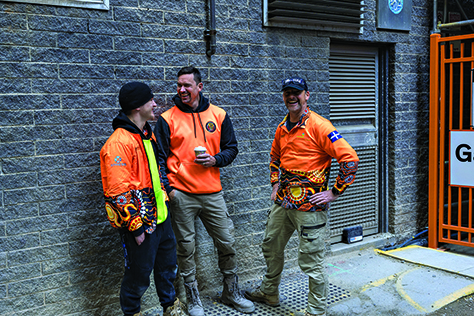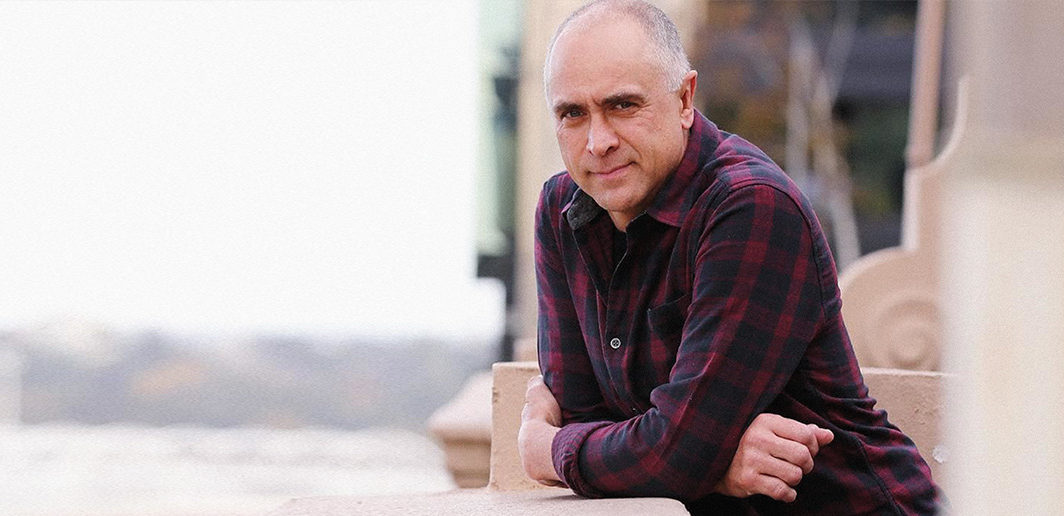WAYNE I shared that because I want people to understand that mental health conditions and suicide can affect any one of us. You can be a premiership player, you can be reasonably well paid, you can be doing something that very few people get the opportunity to do, but that doesn’t mean that you don’t or aren’t exposed with mental health conditions. And on that particular day - it’s a great moment in my life. I love it, and I have fond memories of it - but the reality is that I was three years into my diagnosis by that stage. It had morphed into depression, anxiety, and obsessive-compulsive disorder. I had three concurrent mental health conditions which were wreaking havoc on every area of my life yet, I was able to go out on the biggest day of my sporting career and become a premiership player and have a reasonably good game.
I used that photo because it’s really important that people understand that material possessions and money have nothing to do with happiness, because I had all of the things that you would think or assume would make you happy, yet I was miserable. And I was thinking about how I can end my life, and that was a struggle that I was in for four and a half years.
DANIEL During that period you won two Best and Fairest awards at North Melbourne. For people that don’t follow football that closely, there’s a man by the name of Wayne Carey, one of the all-time greats, who at that time was at the peak of his powers, and you won back-to-back club Best and Fairest ahead of him… that shows how you can still be performing at a high level while dealing with other issues.
WAYNE Yeah, I’m really glad you’ve said it that way because that’s one of the messages that I share with people, that you can achieve anything you want to achieve whilst living with mental health conditions. And I think that’s encouraging for other people. It doesn’t have to stop your life.
DANIEL I can understand having to hold onto some of these things because of the stigma and everything else that’s attached. One of the things that you talk about in your work at Puka Up is the #stigmastopswithme. How important is that for people to understand that these conditions exist and the stigma needs to break down for people to move forward?
WAYNE The #stigmastopswithme is really important because I lived with so much shame, guilt, and embarrassment for 12 and a half years because of the way that I thought towards myself because I had mental health conditions. I hid that behind this paralysing fear of shame, and that prevented me from getting healthy, from getting well, for a long period of my life.
You, I, everybody has an opportunity, but I also think we have a responsibility, we need to stand up and if stigma exists, it needs to stop because it’s stopping people from getting help. It’s also potentially a contributing reason why we lose so many people with the issue of suicide… and that’s not right.
What drives me is that in Australia we lose, on average, eight people a day to suicide. Six of those eight suicides are men. Why is that happening? Because we’re living in a world that conditions men to disconnect emotionally because that’s not what a man is meant to do. That’s wrong, and that’s got to change.
DANIEL Mental health doesn’t discriminate, people of all ages and all walks of life struggle with varying states of mental health. That extends to the job site as well. Rates of suicide are growing alarmingly among people in construction. The increased emotional and physical strain on the modern tradie coupled with the macho image that they’re expected to maintain is almost creating the perfect storm for people to really have a problem.
WAYNE The construction industry, along with the mining industry, resources industry, even the financial industry, the rates of people that work in those industries that are living with significant mental health conditions, that are in crisis, that are thinking about taking their life or are taking their life are disproportionately higher to the rest of the general population. It’s an issue, and it’s an issue everywhere and I’m incredibly passionate about challenging the definition of masculinity and the narrative that a lot of males, myself included, have been fed for decades.
What we’re actually doing is we’re limiting men’s ability to stay connected emotionally. It’s not weak to be vulnerable. It’s not weak to cry. It’s not weak to ask for help. It’s not weak to put your hand up and seek professional help. If we don’t challenge the messaging around that, we cannot realistically expect to address the issue within the construction industry and across the country. The numbers of people living with these conditions is going up. The number of people taking their lives is going up. We had 3,128 in 2017. The year before, it was 2,866.
DANIEL It’s also alarming that 20 times that amount made an attempt to take their lives… more than 65,000 people.
WAYNE 65 and a half thousand people attempt to end their lives every year in Australia. That’d make it the fifth largest town in Victoria and the 27th largest town in Australia!
DANIEL …And suicide is the leading cause of death in people aged 15 to 44. That is crazy!
WAYNE Yep. If that is not alarming enough for individuals, for communities, for businesses and for this entire country to sit back and go, “We’ve got to address this,” then I don’t know what is. Having said all of that, Puka Up’s focus is on addressing it because it needs to change. We’re losing too many It’s not weak to cry. It’s not weak to ask for help. It’s not weak to put your hand up and seek professional help. valuable people within our communities, within our businesses, within our country that we believe don’t have to end their life. We’ve got to do something proactively that gives these people the opportunity and the space for them to get the appropriate help that they need much earlier.
It’s OK to talk
DANIEL One of the things that stops many from getting involved with the struggles of their friends, family or colleagues is that they simply don’t know how to and instead do nothing, in fear that their actions may make things worse.
So, how do you know if someone is struggling and what can you do to help?
WAYNE Warning signs or signs and symptoms of somebody being under emotional stress are lack of sleep, being agitated, they might be coming to work late, they might be going for longer lunches, they might be leaving work earlier, they may not even be coming to work at all. They might be increasing their alcohol intake, become confrontational, argumentative, isolating when normally engaged and loves to chat, not returning phone calls, not replying to emails or text messages or not going to social settings. They’re all things that could potentially indicate somebody may be under emotional stress, and things that we can look out for.
I think having the ability to identify something that may give you reason to think that something’s not right is only half of what should happen. The other half, and this is just as important if not more important, is how do I have this conversation with someone that I’m concerned about?
It’s got to be done in such a way that your language, your tone, the way that you deliver the message is supportive and nonjudgmental, because if we try to call someone out, it may have quite a negative impact on how that person responds.
It needs to be about creating a safe space that invites the person that you’re worried about into a conversation. It may be something as simple as “Hey, Daniel, let’s go and have a coffee… mate, is everything okay? I’m not sure what the problem is, but you seem to be a little bit different. If you want to talk to me about it, I just want you to know that I’m here to talk to. I may not have the answers, but I just want you to know it’s important for me that you know, if you want to talk to somebody that you can trust, I’m prepared to listen.”
This is a really simple example of how we can begin these conversations, because it’s giving the person that I’m worried about the option to choose whether or not you want to come in the conversation. I’m not criticizing or putting someone down. I’m not telling you that you’re weak. I’m not telling you to harden up and be a man because that is destructive language. If I use that language, I may be manifestly making the situation for a person I’m concerned about, especially men, worse because I’m telling him that he’s weak and he’s soft. So don’t use any of that. Use language and questions that hopefully create a space where the person that I’m concerned about can trust me enough to talk to me about it.
Language, tone and delivery are really important because all you want to do is facilitate a space for somebody you care about to be able to come into and talk to me about whatever they want to talk to me about. And I have these conversations with a lot of male mates, that wouldn’t have happened 10 years ago. I won’t judge them. All I’m interested in is how can I support this person who may be going through a tough time? We’ve all got the same opportunity.
If it’s having an impact in your life, my strong advice is to go and seek help. Don’t do what I did and ignore your health for six years, self-medicate through alcohol and drugs because it doesn’t work. Put your hand up or go and find someone that you can trust and ask for help, because once you get help, you can start to get healthy and well again - that is the most important thing.
Puka Up is a social enterprise founded by one of Australia’s leading mental health advocates, Wayne Schwass. Puka Up’s vision is to make genuine conversations around mental health a part of everyday life, with the aim to eliminate suicide. If you or someone you know needs help, visit www.pukaup.com/help
You can listen to the full podcast here

